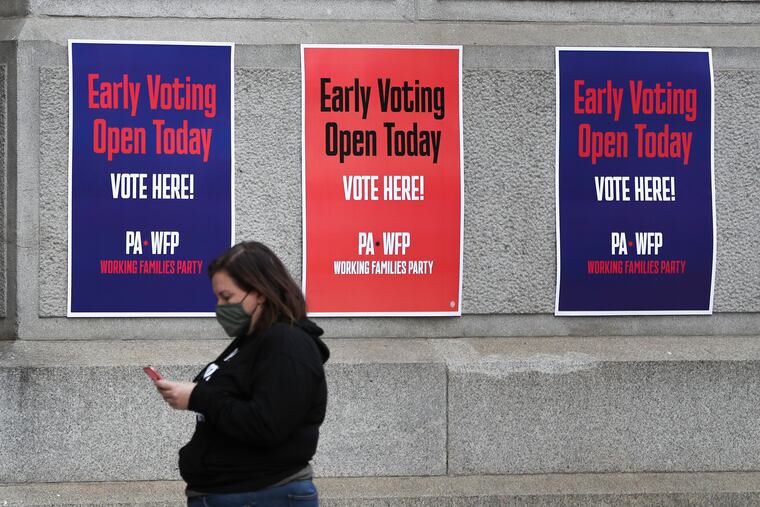The Working Families Party wants to have it both ways
By trying to control the Democratic nominations and win the minority-party seats, the WFP looks to dictate control of at-large City Council seats. It’s perfectly legal, if not especially honest.

What kind of political party endorses candidates in other parties’ primaries? The kind that can’t decide whether it’s a faction of the mainstream or a true independent voice, whether it’s a pressure group or an attempt to build something new.
In Philadelphia, this misbegotten faction calls itself the Working Families Party. Are they idealistic social democrats or opportunistic grifters? It depends on whom you ask. Whatever the answer is, it’s hard to deny that the lefty organization gives a small vanguard of progressives an outsized influence in the city’s politics.
This is especially true in their attempts to win at-large seats on City Council — subverting an important part of the reformers’ goals in the 1951 Philadelphia Home Rule Charter.
Philadelphia has not been a political toss-up in a long time. In the first half of the 20th century, it was solidly Republican. The GOP often controlled all 22 seats on City Council under the 1919 City Charter. Forty years after that document was enacted, city notables assembled to write a new one, which became the 1951 charter that — in a much-amended form — governs the city today.
One-party power meant that opposing voices would often never even be heard in the city’s legislature. The drafters of the 1951 charter solved this problem by creating seven at-large seats, for which any party could nominate only five candidates — a system called “limited voting.” At least two seats would, therefore, be filled by the second-most popular party in the city. That there were two was important.
» READ MORE: In crowded race for Philly mayor, ranked-choice voting makes sense | Kyle Sammin
As Mayor Joseph S. Clark noted sometime later in his chapter of Philadelphia: A 300-Year History, having two non-majority-party members meant “one to propose and the other to second a minority position, thus assuring a minority-party vote.” No longer would minority-party voices be silent on City Council, as they had for most of the first half of the century.
Clark and Richardson Dilworth, the first two mayors under the 1951 charter and two of its prime proponents, took this idea seriously. Even though they were both Democrats, they endorsed a reform-minded Republican for an at-large council vacancy when one occurred in 1954, to preserve the intent of the limited-voting arrangement.
There is currently a minority-party at-large seat open on City Council, but the powers that be have decided to leave it unoccupied until next year. Who fills that seat and the second minority seat in the coming election is of great interest to the Philly GOP and the Working Families Party. For the Republicans, there is no big mystery to the effort: They are an opposing party to the Democrats and would use the seats to present an alternate vision for the governance of the city.
For the Working Families Party, this distinction is not so clear-cut. Do they present an alternative point of view to Democrats? It’s hard to say that for sure when they openly endorsed several Democrats in the recent primary — including Helen Gym, a former at-large Council member who ran unsuccessfully for mayor.
If the Working Families Party wants to act as a pressure group within the Democratic Party, why not work to have their people win the Democratic nomination? Because they want to have it both ways: independent voices when they can win, loyal Democrats when they can’t. That’s why they endorsed establishment Democrats such as Andrew Cuomo in New York in years past, even when independent left-wing challengers were in the fight for the nomination.
By trying to control the Democratic nominations and win the minority-party seats, the Working Families Party looks to dictate control of all seven at-large seats. It’s perfectly legal, but it’s not especially honest or conducive to good government.
The Working Families Party’s influence is limited, as shown in the recent mayoral primary where their endorsed candidate came in third place and Cherelle Parker — a Democrat whose endorsements came from other Democrats — won. But party leaders are still concerned about divided loyalties. Last month, Democratic Party Chair Bob Brady warned that Democratic ward leaders and committeepeople who endorse non-Democrats in November will face expulsion from party posts.
» READ MORE: On Sixers arena and beyond, Philly must dream big | Kyle Sammin
Brady is not out of line for thinking that members of the Democratic Party apparatus should work to elect Democrats. But part of the blame for the chaos the Working Families Party has created in limited voting elections is the fault of the city’s Republican Party and of voters generally. In 1991, it took Joan Specter 158,778 votes to win the second of the minority-party seats on City Council. By 2011, David Oh won that same seat with less than one-quarter of the votes that it took Specter.
If the Republicans weren’t going to try to turn out their voters, it was inevitable that some other group would take what was being left up for grabs. By 2019, the Working Families Party did just that, taking one of the two seats reserved for minority parties.
In 2023, the faux third-party candidates would like to take the other one, too. But they’ve also endorsed two of the five Democrats they’re running against.
It’s a subtle attempt to slide back into one-party rule, with the weird twist that instead of a major-party machine in charge, it’s all run by the backroom machinations of a few left-wing activists. Brady is right to rally Democrats against the idea, and the Philly Republican Party should do the same.